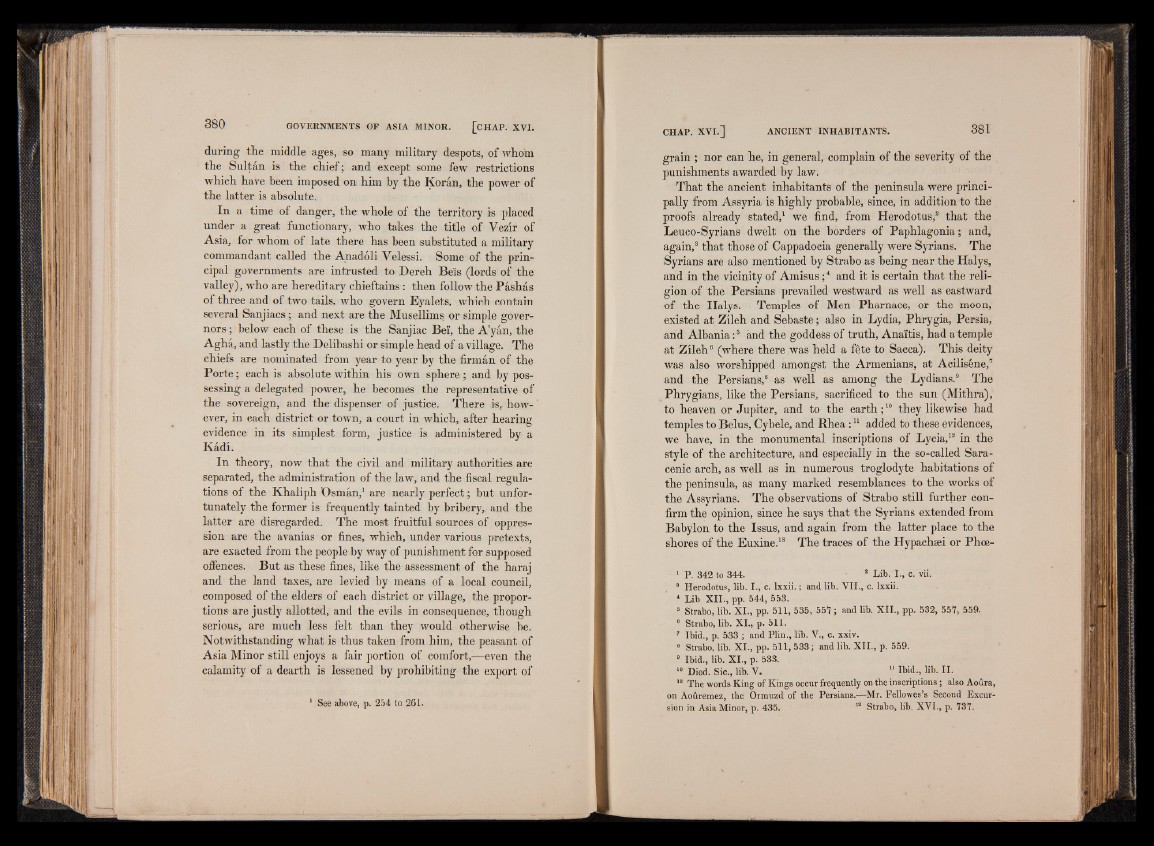
during the middle ages, so many military despots, of whom
the Sultán is the chief; and except some few restrictions
which have been imposed on him by the Koran, the power of
the latter is absolute.
In a time of danger, the whole of the territory is placed
under a great functionary, who takes the title of Vezir of
Asia, for whom of late there has been substituted a military
commandant called the Anadóli Velessi. Some of the principal
governments are intrusted to Dereh Bei's (lords of the
valley), who are hereditary chieftains: then follow the Páshás
of three and of two tails, who govern Eyalets, which contain
several Sanjiacs; and next are the Musellims or simple governors;
below each of these is the Sanjiac Bei, the A’yán, the
Aghá, and lastly the Delibashi or simple head of a village. The
chiefs are nominated from year to year by the firman of the
Porte; each is absolute within his own sphere; and by possessing
a delegated power, he becomes the representative of
the sovereign, and the dispenser of justice. There isr how- ’
ever, in each district or town, a court in which, after hearing
evidence in its simplest form, justice is administered by a
Kádí.
In theory, now that the civil and military authorities are
separated, the administration of the law, and the fiscal regulations
of the Khaliph ’Osman,1 are nearly perfect; but unfortunately
the former is frequently tainted by bribery,, and the
latter are disregarded. The most fruitful sources of oppression
are the avanias or fines, which, under various pretexts,
are exacted from the people by way of punishment for supposed
offences. But as these fines, like the assessment of the haraj
and the land taxes, are levied by means of a local council,
composed of the elders of each district or village, the proportions
are justly allotted, and the evils in consequence/though
serious, are much less felt than they would otherwise be.
Notwithstanding what is thus taken from him, the peasant of
Asia Minor still enjoys a fair portion of comfort,— even the
calamity of a dearth is lessened by prohibiting the export of
grain ; nor can he, in general, complain of the severity of the
punishments awarded by law.
That the ancient inhabitants of the peninsula were principally
from Assyria is highly probable, since, in addition to the
proofs already stated,1 we find, from Herodotus,2 that the
Leuco-Syrians dwelt on the borders of Paphlagonia ; and,
again,3 that those of Cappadocia generally were Syrians. The
Syrians are also mentioned by Strabo as being near the Halys,
and in the vicinity of Amisus ;4 and it is certain that the religion
of the Persians prevailed westward as well as eastward
of the Halys. Temples of Men Pharnace, or the moon,
existed at Zileh and Sebaste ; also in Lydia, Phrygia, Persia,
and Albania :5 and the goddess of truth, Anaïtis, had a temple
at Zileh6 (where there was held a fête to Saeca). This deity
was also worshipped amongst the Armenians, at Acilisêne,7
and the Persians,8 as well as among the Lydians.9 The
Phrygians, like the Persians, sacrificed to the sun (Mithra),
to heaven or Jupiter, and to the earth ;10 they likewise had
temples to Belus, Cybele, and Rhea :11 added to these evidences,
we have, in the monumental inscriptions of Lycia,12 in the
style of the architecture, and especially in the so-called Saracenic
arch, as well as in numerous troglodyte habitations of
the peninsula, as many marked resemblances to the works of
the Assyrians. The observations of Strabo still further confirm
the opinion, since he says that the Syrians extended from
Babylon to the Issus, and again from the latter place to the
shores of the Euxine.13 The traces of the Hypachæi or Phoe-
1 P. 342 to 344. 8 Lib. I., e. vii.
8 Herodotus, lib. I., c. lxxii. ; and lib. VII., c. lxxii.
4 Lib XII., pp. 544, 553.
5 Strabo, lib. XI., pp. 511, 535, 557 ; and lib. XII., pp. 532, 557, 559.
8 Strabo, lib. XI., p. 511.
7 Ibid., p. 533 ; and Plin., lib. V., c. xxiv.
8 Strabo, lib. XI., pp. 511, 533 ; and lib. XII., p. 559.
8 Ibid., lib. XI., p. 533.
10 Diod. Sic., lib. V. 11 Ibid., lib. II.
18 The words King of Kings occur frequently on the inscriptions ; also Aoûra,
on Aoûremez, the Ormuzd of the Persians.—Mr. Fellowes’s Second Excursion
in Asia Minor, p. 435. 18 Strabo, lib. XVI., p. 737.